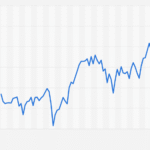Investors often wake up to news of the stock market taking a tumble and wonder, “Why is the market down today?” While market declines can sometimes feel random, they are often rooted in underlying factors. Understanding these reasons can help you make sense of daily market movements and guide your long-term investment decisions.
Here’s a closer look at some of the most common drivers behind a market downturn.
Economic Indicators
Economic data plays a significant role in influencing the stock market. Reports on unemployment, inflation, consumer spending, or GDP growth can sway market sentiment. For instance, if inflation data comes in higher than expected, it may signal that the Federal Reserve could raise interest rates. Higher rates increase borrowing costs, reduce corporate profits, and make bonds more attractive compared to stocks.
For example, earlier this year, a surprisingly strong jobs report led to fears of an overheated economy, weighing down major indexes. Even if the broader economy isn’t struggling, markets may react negatively to any sign that a cooling measure might be necessary.
Geopolitical Events
The stock market doesn’t operate in a vacuum—it is deeply affected by global events. Conflicts, trade disputes, or even natural disasters can disrupt markets by creating uncertainty. When geopolitical tensions escalate, investors may flee to safer assets like Treasury bonds, causing stocks to drop.
Take the example of heightened tensions between two major economies. Threats of sanctions or trade restrictions can create supply chain disruptions, unsettling businesses and rattling investors.
Corporate Earnings Reports
If a major company reports results that fall short of expectations, it can drag down not just their stock, but also those in the same sector. Poor guidance about future performance can amplify this effect.
For instance, a tech giant missing its quarterly earnings estimates might lead to a broader sell-off in the technology sector, pulling the entire market down with it.
Investor Sentiment
Fear, uncertainty, or even over-optimism can influence moods and decisions. Sentiment can swing sharply in reaction to news—whether it’s related to the Federal Reserve’s interest rate decisions, a new economic policy, or a surge in oil prices.
Recently, the stock market saw a decline after a Federal Reserve official suggested that rate hikes could continue longer than anticipated. This stirred fears of an economic slowdown, leading to a significant sell-off.
How Should Investors Respond?
Down days in the market are inevitable, but they can be intimidating for new and experienced investors alike. Here are some strategies to help you stay grounded during times of market turbulence:
- Focus on the Long Term – Markets are volatile in the short term but tend to reward patience over the long haul. Stick to your investment goals and avoid knee-jerk reactions based on day-to-day movements.
- Diversify Your Portfolio – A well-diversified portfolio can reduce the impact of a downturn in any single asset class or sector.
- Stay Informed, but Not Overwhelmed – While it’s important to keep up with market news, avoid obsessing over every headline. Instead, focus on fundamentals and keep learning about how the market operates.
- Consider Opportunities – Market dips can be a chance to buy quality stocks at discounted prices. If you’ve done your research and are confident in a company’s fundamentals, take advantage of the lower entry point.
Final Thoughts
The stock market’s daily swings are influenced by a mix of factors, including economic data, geopolitical events, corporate earnings, and investor sentiment. While it’s useful to understand what’s driving a downturn, it’s equally important to stay rooted in long-term strategies and not be swayed by fear.
Remember, market declines are a normal part of investing, and they often pave the way for future growth opportunities. Stay informed, stay calm, and always keep your portfolio aligned with your financial goals.


